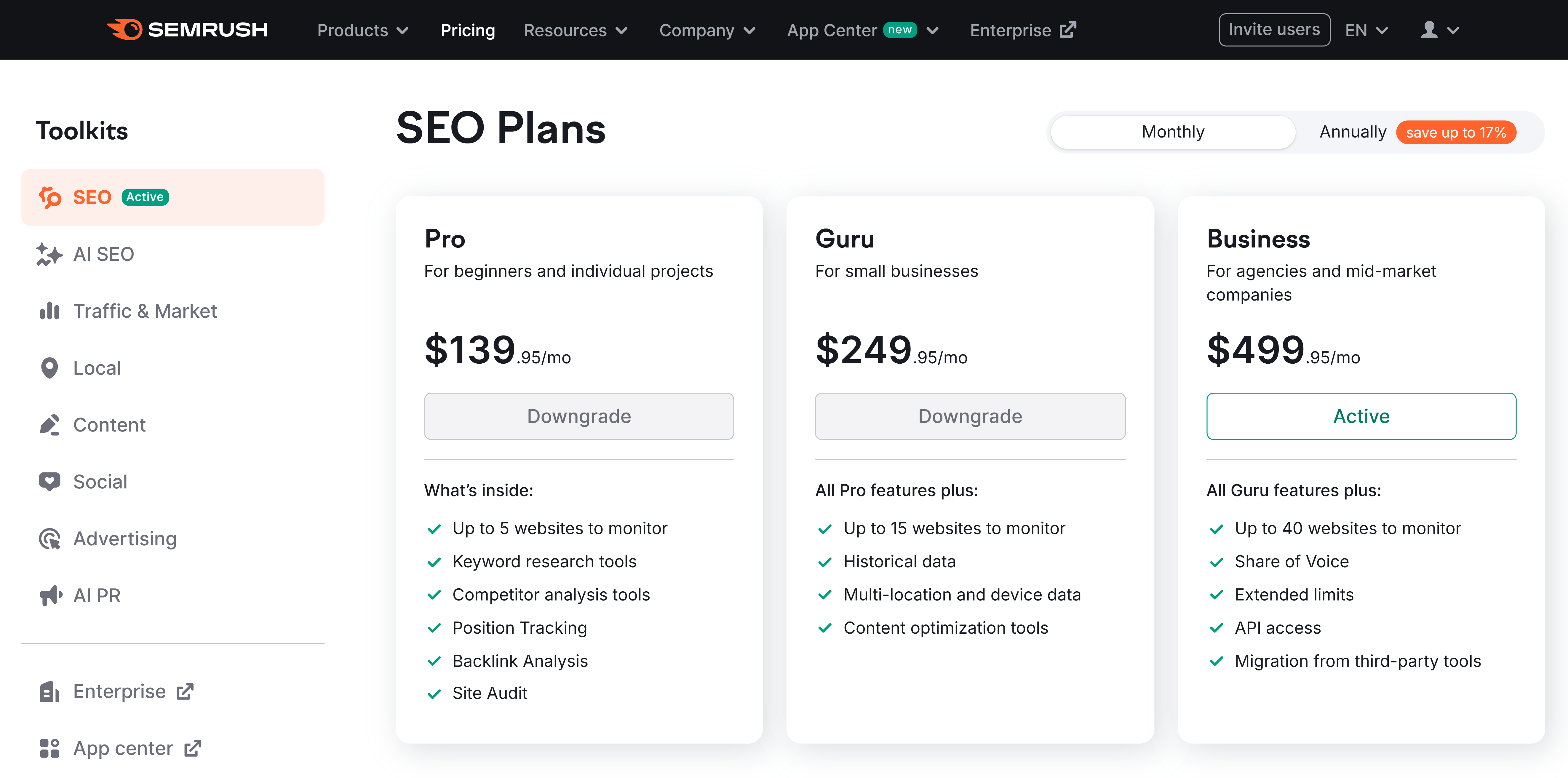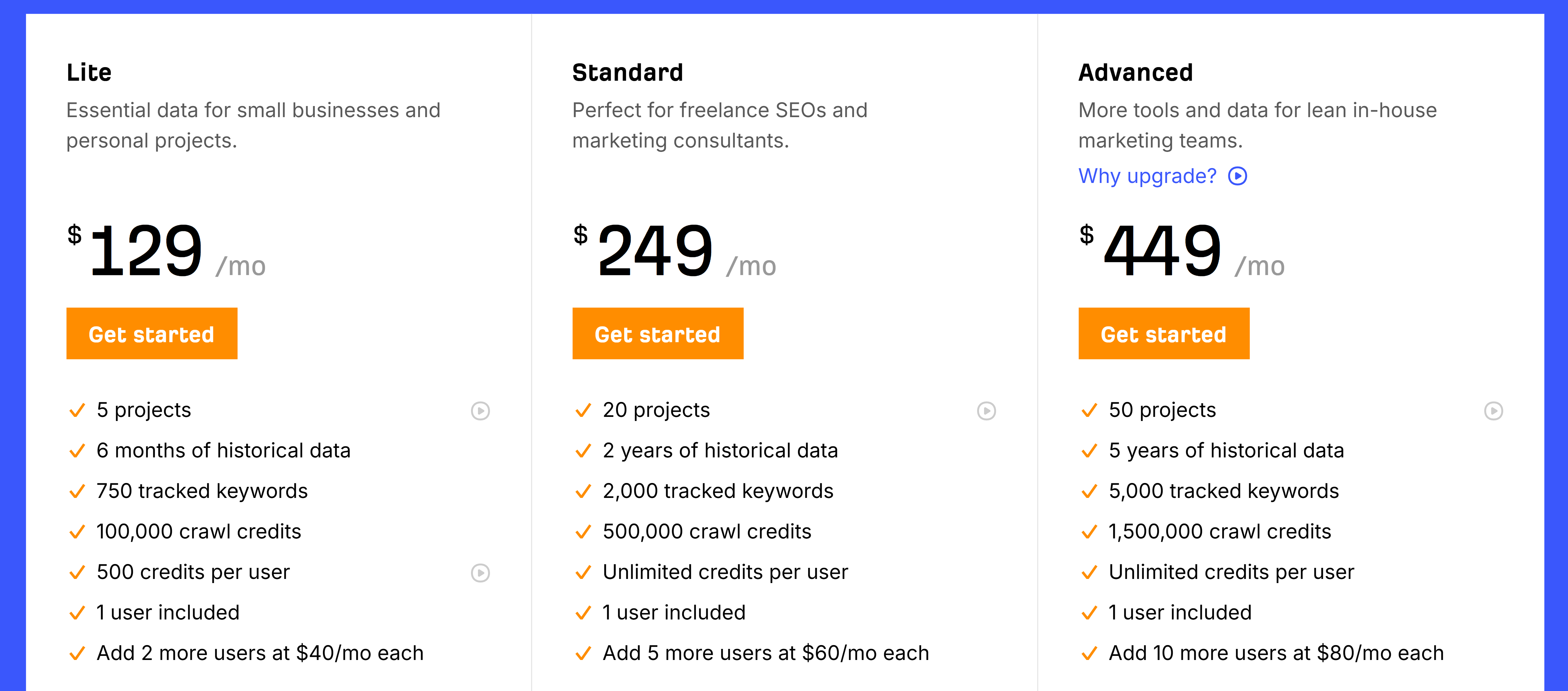Everyone says you need expensive SEO tools to succeed online. That myth has probably cost more small businesses their marketing budget than any other piece of bad advice in digital marketing. The truth? Most beginners blow hundreds of dollars monthly on tools they barely understand while missing the free resources that could actually move the needle.
Think about it – what good is a $399/month enterprise SEO suite when you’re still figuring out what a meta description does? It’s like buying a Formula 1 car for your morning commute. Sure, it’s powerful. But you’re stuck in the same traffic.
Here’s what actually matters: you need tools that match your skill level, solve real problems, and don’t drain your budget before you’ve made your first dollar from organic traffic. The smartest approach? Start with the essentials, master them, then scale up. This guide shows you exactly which SEO tools deserve your attention (and budget) right now.
Essential SEO Tools Every Beginner Should Use
Most beginners get overwhelmed looking at the endless parade of SEO software promising overnight success. You scroll through comparison charts and feature lists and pricing tiers until your eyes glaze over. Sound familiar?
Let’s cut through the noise. You only need five core tools to start seeing real traffic improvements. Everything else is just expensive decoration until you’ve mastered these fundamentals.
1. Semrush for Complete SEO Management
Semrush sits at the intersection of powerful and approachable – exactly where beginners need to be. At $139/month for the Pro plan, it’s an investment, but here’s why it earns that spot: you get keyword research and site audits and competitor tracking and content optimization all under one roof. No juggling between platforms.
The Keyword Magic Tool alone justifies the price tag. Type in any seed keyword and watch it generate thousands of related terms with search volume, difficulty scores, and SERP features. Most people waste time on X and Y features, but the real experts focus on this: find keywords with 100-1000 monthly searches and difficulty under 30. That’s your sweet spot.
What drives beginners crazy is trying to compete for “credit cards” or “insurance” right out of the gate. Semrush’s difficulty scoring keeps you grounded. It shows you exactly which battles you can win today versus the ones that’ll crush you.
2. Ahrefs for Backlink Analysis
Here’s an uncomfortable truth: your content could be Shakespeare-level brilliant, but without backlinks, Google won’t care. Ahrefs ($99/month starter plan) specializes in showing you who’s linking to whom and why it matters.
The Site Explorer feature reveals your competitor’s entire backlink profile in seconds. You see which sites link to them, what content earned those links, and most importantly – which opportunities they missed. It’s competitive intelligence at its finest.
But the real magic happens in the Content Gap tool. Upload three competitor domains and your own. Ahrefs instantly shows keywords they all rank for that you don’t. Last Tuesday, a client discovered 47 keywords this way and doubled their traffic in four months just by filling those gaps.
3. SE Ranking for Budget-Friendly Solutions
Not everyone has $100+ monthly to spend on SEO tools. SE Ranking gets that. Starting at just $39/month, it delivers 80% of what the big players offer at a fraction of the cost. Perfect for solopreneurs and small teams.
The keyword rank tracker updates daily (not weekly like some competitors), and you can monitor up to 250 keywords on the basic plan. The interface feels less overwhelming than Semrush or Ahrefs – almost like they designed it specifically for people who don’t live and breathe SEO.
| Feature | SE Ranking | Semrush Pro | Ahrefs Lite |
|---|---|---|---|
| Starting Price | $39/month | $119/month | $99/month |
| Keywords Tracked | 250 | 500 | 750 |
| Site Audit Pages | 25,000 | 100,000 | 10,000 |
| Best For | Small businesses | Growing teams | Link builders |
4. Google Search Console for Direct Insights
Why pay for data when Google gives it away free? Search Console shows exactly how Google sees your site – no interpretation needed. You get real search queries, click-through rates, and indexing issues straight from the source.
The Performance report alone makes this essential. You see which pages get impressions but no clicks (fix your title tags), which keywords you’re ranking on page 2 for (easy wins with minor optimization), and which pages Google struggles to crawl (technical issues killing your rankings).
Most beginners ignore Search Console because it’s free. Big mistake. This tool shows problems that $500/month software might miss because it’s pulling data directly from Google’s index.
5. Moz Pro for Learning Resources
Moz Pro ($99/month) might not have Ahrefs’ backlink database or Semrush’s feature list, but it excels at something equally valuable: teaching you SEO while you work. Every feature includes explanations, best practices, and actionable tips.
The MozBar browser extension deserves special mention. It overlays SEO metrics directly on Google search results – Domain Authority, Page Authority, link metrics. You’re literally seeing the competitive landscape as you search. Takes two seconds to install and changes how you view SERPs forever.
If you’d rather skip straight to a tested list, check out our analysis of the best SEO tools for different needs to see which ones fit your stage and goals.
Mastering Keyword Research and Content Optimization
Keywords aren’t what they used to be. Google’s algorithms have evolved past simple keyword matching to understanding context and intent and user satisfaction. Yet beginners still stuff keywords like it’s 2010.
Modern keyword research is about finding opportunities where you can genuinely help searchers while facing manageable competition. Let’s break down exactly how to do that.
Finding High-Value Keywords with Research Tools
The biggest mistake? Starting with broad, competitive terms. “Digital marketing” gets 74,000 searches monthly. Know how many pages compete for it? 14.7 billion. Good luck with that.
Instead, use keyword research tools to find the gaps. Start with a broad topic, then drill down three levels deep. “Digital marketing” becomes “digital marketing for dentists” becomes “Facebook ads for dental practices under $1000.” Now you’re talking about 300 searches monthly with 50,000 competing pages. Winnable.
Here’s the workflow that actually works:
- Enter your main topic into any keyword tool
- Filter for questions (these reveal actual problems people need solved)
- Look for keywords with 100-1,000 monthly searches
- Check the top 10 results – if you see forums or weak sites ranking, you’ve found gold
- Export everything to a spreadsheet and prioritize by difficulty-to-volume ratio
Understanding Search Intent and User Behavior
Google obsesses over search intent because satisfied users keep coming back. You need to match what searchers actually want, not what you think they want. There’s a massive difference.
Someone searching “best CRM software” isn’t ready to buy – they’re comparing options. But “Salesforce pricing plans” signals purchase intent. Same topic, completely different content needed. Miss this distinction and your perfectly optimized page bounces 90% of visitors.
“The query ‘how to tie a tie’ needs a video or illustrated guide, not a 3,000-word history of neckwear. Intent trumps everything.” – Every successful SEO ever
Using Long-Tail Keywords for Quick Wins
Long-tail keywords are your secret weapon as a beginner. While everyone fights over “running shoes,” you can dominate “best running shoes for flat feet under $100.” Lower search volume? Sure. But also 10x easier to rank and 3x more likely to convert.
The math works in your favor. Rank #1 for a 10,000-search keyword? Maybe 3,000 clicks monthly if you’re lucky. But rank #1 for ten 300-search long-tails? Same traffic, except you achieved it in three months instead of three years.
Use Answer The Public or AlsoAsked to find these golden long-tails. They scrape Google’s autocomplete and People Also Ask boxes – basically showing you exactly what people type when they’re desperate for answers.
Competitor Keyword Gap Analysis Techniques
Why guess what keywords to target when your competitors already did the research? SEO tools for competitor analysis reveal their entire keyword strategy in minutes.
Pick three competitors ranking where you want to be. Not aspirational competitors (stop comparing yourself to HubSpot), but sites maybe 6-12 months ahead of you. Run them through Ahrefs’ Content Gap or Semrush’s Keyword Gap tool along with your domain.
The overlap shows keywords multiple competitors rank for that you don’t. That’s not coincidence – that’s validation. If three sites in your space all target “email automation for ecommerce,” there’s money in that keyword.
But here’s what most people miss: look for keywords only one competitor ranks for. These represent untapped opportunities they found that others haven’t discovered yet.
Ready to scale your workflow even further? Explore SEO automation tools designed to handle audits, tracking, and optimization with minimal input.
Building Quality Backlinks That Drive Results
Let’s address the elephant in the room: link building feels sleazy because so much of it IS sleazy. Spam emails and link farms and paid placements have turned a fundamental ranking factor into something people actively avoid discussing.
Yet backlinks remain Google’s strongest trust signal. One link from a respected site in your industry can transform your rankings overnight. The trick is building links that would exist even if Google didn’t.
Link Prospecting with BuzzStream
BuzzStream ($24/month starter) turns chaotic link building into a repeatable process. Think of it as a CRM specifically for outreach – tracking conversations and follow-ups and response rates all in one place.
The prospecting feature pulls contact information and social profiles and domain metrics automatically. You build targeted lists of sites worth pitching, then BuzzStream helps you find the right person to contact. No more generic info@ emails into the void.
What really sets it apart? The relationship tracking. You see every interaction with a site over time. That blogger who ignored you six months ago? Maybe they’ll bite now that you have better content. BuzzStream remembers so you don’t have to.
Email Outreach Automation Strategies
Nobody likes receiving template emails. “Dear [Website Owner], I noticed your great article about [Topic]…” Delete. Yet manual personalization doesn’t scale. What’s the solution?
Semi-automation. Use SEO tools for link building to handle the repetitive stuff – finding emails and sending follow-ups and tracking opens – while you focus on crafting messages that don’t sound like robots wrote them.
Here’s a framework that actually gets responses:
- Reference something specific from their recent content (proves you’re human)
- Explain the clear value you’re offering (not what you want)
- Make the ask small and specific (not “please link to me”)
- End with a question that’s easy to answer
Response rates jump from 2% to 15%+ when you stop asking for favors and start offering value. Create a resource that makes their existing content better. Fix a broken link. Provide original data they can cite.
Also Read: Understanding SEO Agent
Finding Contact Information with Hunter.io
Hunter.io ($49/month) solves the most annoying part of outreach: finding email addresses. Enter any domain and it returns verified email addresses for people at that company. The Chrome extension even works on LinkedIn profiles.
But here’s the pro move: use Hunter’s “Author Finder” feature. Paste any article URL and it identifies who wrote it plus their email. You’re now pitching the actual decision-maker, not some generic inbox. That alone doubles response rates.
The email verifier prevents another common problem – bounced emails hurting your sender reputation. Run your entire outreach list through it first. Better to know an email’s dead before you waste time crafting the perfect pitch.
Tracking Link Building Campaign Success
Most link builders track the wrong metrics. They obsess over Domain Authority or total links built. But what actually matters? Traffic and rankings from those links.
Set up a simple tracking system:
| Metric | Tool | Why It Matters |
|---|---|---|
| Links Built | Ahrefs/Google Search Console | Volume of effort |
| Referring Domain Quality | Moz/Ahrefs DR | Link strength |
| Target Page Rankings | Rank tracker | Actual impact |
| Referral Traffic | Google Analytics | Direct value |
| Conversion Rate | Goal tracking | Business impact |
A single link that sends 50 qualified visitors monthly beats 20 links from sites nobody visits. Quality over quantity isn’t just a cliché – it’s how modern link building works.
While these metrics show effort and results, SEO reporting tools can help you visualize long-term performance trends automatically.
Taking Action with Your SEO Tools
You’ve got the tools. You understand the strategies. So why do most people still fail at SEO? They get paralyzed by options and analysis and the fear of doing something wrong.
Here’s the truth nobody tells you: imperfect action beats perfect planning every time. That blog post sitting in drafts for six months? Publish it. That outreach email you’ve rewritten twelve times? Send it. You learn more from one failed campaign than from reading 100 guides.
Start with one tool – probably Google Search Console since it’s free. Master it completely before adding another. Run your first technical SEO tools audit this week. Find three broken things and fix them. Small wins build momentum.
The path forward looks like this: Pick your primary tool based on budget (Search Console free, SE Ranking for under $50, Semrush for $100+). Focus on one channel first – either content or links, not both. Set a weekly SEO time block and protect it fiercely. Track one core metric obsessively until it improves.
As your strategy matures, consider integrating AI tools for SEO that streamline repetitive keyword research and content optimization.
Remember – every SEO expert started exactly where you are now. They just started. Your competition is analyzing and planning and waiting for the perfect moment. While they hesitate, you could be ranking. Which will it be?
FAQs
Which free SEO tools should beginners start with?
Google Search Console and Google Analytics are non-negotiable – they’re free and provide data directly from Google. Add Ubersuggest’s free tier for basic keyword research, Google’s PageSpeed Insights for technical checks, and the MozBar browser extension for quick competitive analysis. These five tools cover 60% of what beginners need without spending a dollar.
How much should I budget for paid SEO tools?
Budget $50-150 monthly once you’re serious about SEO. Under $50, grab SE Ranking. Between $50-100, consider Ahrefs Lite or Moz Pro. Over $100, Semrush Pro gives you the most comprehensive toolkit. But here’s the key: don’t buy any paid tool until you’ve maxed out what free tools can teach you. Most beginners jump to paid tools too early and waste money on features they don’t understand.
Can I use multiple SEO tools together effectively?
Absolutely, but there’s a smart way and a wasteful way to do it. Smart combining: Use Google Search Console for indexing issues, Ahrefs for backlink analysis, and Surfer for content optimization. Each tool has a specific strength. Wasteful combining: Paying for three all-in-one tools that overlap 90% in features. Pick one comprehensive tool as your base, then add specialized tools only for specific gaps.
How often should I run technical SEO audits?
Monthly for active sites, quarterly for stable ones. But here’s what matters more than frequency: actually fixing what you find. Running weekly audits means nothing if those 404 errors from three months ago still exist. Schedule audits for the first Monday of each month, spend Tuesday fixing critical issues, and Wednesday on improvements. This rhythm keeps technical SEO from becoming an endless treadmill.
What’s the difference between Semrush and Ahrefs?
Think of Semrush as the Swiss Army knife and Ahrefs as the precision surgical tool. Semrush excels at PPC data, content planning, and social media tracking alongside SEO – perfect if you wear multiple marketing hats. Ahrefs has the superior backlink database and cleaner interface for pure SEO work. Most professionals eventually use both, but beginners should pick based on primary need: Semrush for overall marketing, Ahrefs for link-focused SEO.

Ridam Khare is an SEO strategist with 7+ years of experience specializing in AI-driven content creation. He helps businesses scale high-quality blogs that rank, engage, and convert.






